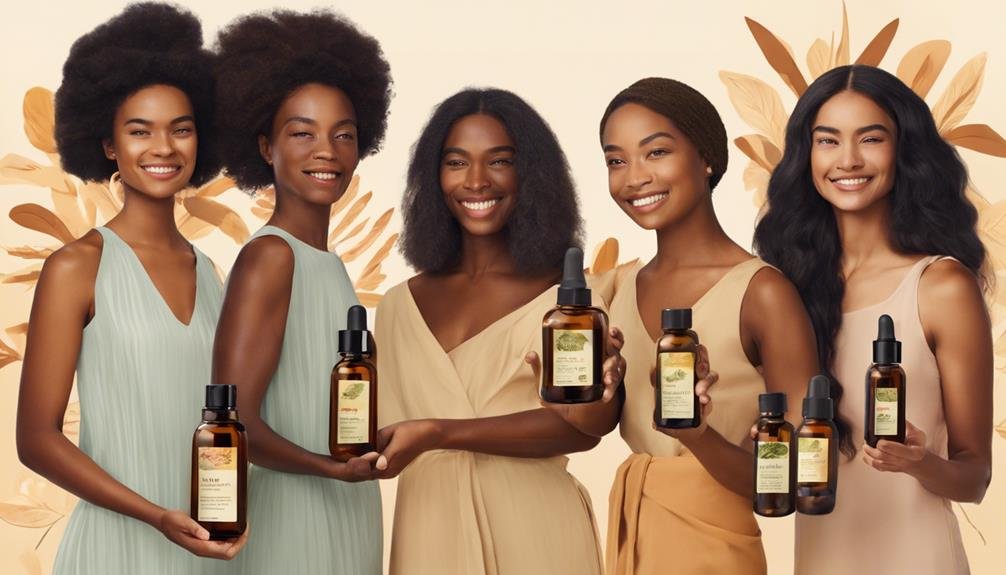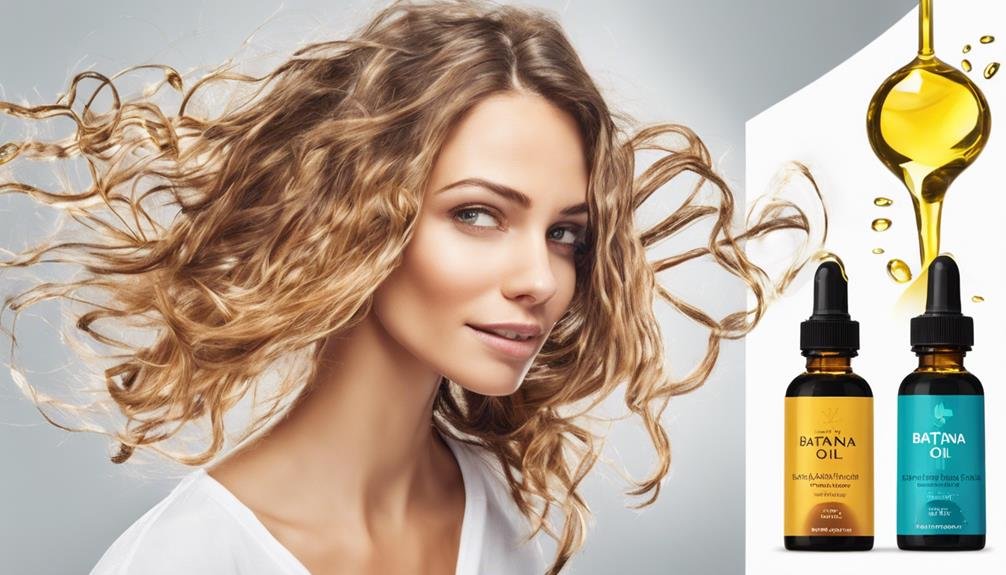You've likely heard the buzz around batana oil and its lauded benefits for hair care, but you might be wondering if it truly lives up to the hype. With a multitude of oils on the market claiming to transform hair health, batana oil stands out primarily due to anecdotal praise rather than solid scientific backing. While many users report enhanced moisture and texture, the question remains: does it actually promote hair growth? This discussion will explore what both research and user reviews have to say, shedding light on whether batana oil is just another trend or a genuine hair care miracle. What will you discover?
Key Takeaways
- Batana oil is traditionally acclaimed for improving hair thickness and texture, though scientific evidence is limited.
- Users often report enhanced softness, shine, and manageability in their hair after using batana oil.
- Comparative studies are lacking, with most positive feedback on batana oil based on anecdotal evidence and personal testimonials.
- Alternative natural oils like rosemary and castor oil have more substantial scientific support for promoting hair growth.
- Considering batana oil's benefits requires weighing anecdotal successes against the absence of rigorous clinical research.
Overview of Batana Oil
Batana oil, extracted from the nuts of the American palm tree Elaeis oleifera, is prized for its unique properties and origins in Central and South America. As you explore its benefits, you'll find it rich in essential fatty acids, antioxidants, and packed with vitamins A and E. These nutrients are key players in maintaining moisture retention and promoting scalp health.
Traditionally utilized by the Miskito people, batana oil has a longstanding history in hair care routines. It's often used as a mask or pre-shampoo treatment. This traditional use underscores its reputed benefits, which include nurturing and restoring hair's natural sheen.
There's plenty of anecdotal evidence suggesting it might even encourage hair growth, although scientific proof is still on the sparse side.
If you're considering incorporating batana oil into your own hair care regimen, you're tapping into centuries of traditional knowledge. While it's true that extensive scientific studies are lacking, the anecdotal praise it receives—especially for its effectiveness in moisture retention and as a scalp treatment—is hard to ignore.
Whether you're aiming to revitalize your hair or simply maintain its health, batana oil could be worth a try, blending rich tradition with contemporary beauty practices.
Batana Oil vs. Batana Butter
As you explore the differences between batana oil and batana butter, it's important to reflect on how they're extracted.
Batana oil is cold-pressed, a method that tends to preserve more of the natural benefits compared to the potentially higher temperatures used for batana butter, which might reduce its effectiveness.
These differences in production can influence not just the texture but also how well each product performs in your skin and hair care routines.
Extraction Process Comparison
Understanding the extraction methods used for batana oil and batana butter is fundamental in choosing the right product for your hair care routine.
Batana oil, derived from the nuts of the American palm through a cold-pressing method, maintains the unprocessed nature that's so beneficial for your hair and scalp. This technique preserves the biologically active substances and nutrients that are essential for moisturizing and nourishing your hair.
In contrast, batana butter undergoes a process that involves higher temperatures, which can diminish its efficacy by degrading some of these important components. While batana oil is celebrated for its superior moisturizing qualities, batana butter, with its thicker consistency, might still be the go-to for specific treatments like deep conditioning.
The choice between batana oil and batana butter hinges on their extraction methods. Since batana oil is cold-pressed, it retains more of its natural, beneficial properties, offering significant hair and scalp benefits.
Batana butter, although useful, mightn't deliver the same level of potency due to its processing techniques. When you're deciding what's best for your hair care, consider how the preservation of natural qualities in batana oil could enhance your hair's health and appearance.
Product Efficacy Differences
When comparing the effectiveness of batana oil and batana butter, it's essential to evaluate the impact of their extraction methods on your hair care results.
Batana oil, cold-pressed from the nuts of the American oil palm, retains a wealth of biologically active substances. This process guarantees a high concentration of fatty acids and antioxidants, which are pivotal for maintaining healthy hair and scalp.
In contrast, batana butter, often processed at higher temperatures, mightn't preserve these nutrients as effectively, potentially reducing its efficacy.
The traditional use of batana oil by the Miskito people underscores its historical significance in hair care, highlighting its proven benefits. This deep-rooted heritage points to its superior effectiveness compared to batana butter, which lacks similar historical documentation or recognition.
You'll find that batana oil's thicker consistency offers more intensive moisture and nourishment, ideal if you're seeking potent hair care solutions.
Understanding these differences in nutrient retention and product efficacy can help you choose wisely. If you're aiming for the most impactful results, opting for batana oil might be your best bet, given its richer nutrient profile and proven historical usage in hair care traditions.
Efficacy for Hair Growth

As you explore the potential benefits of batana oil for hair growth, you'll find that while it's rich in nutrients like vitamin E and essential fatty acids, there's a lack of scientific evidence to firmly back its efficacy in promoting hair growth.
Many users share positive stories about improved hair thickness and texture, but these anecdotal claims don't have the support of rigorous clinical studies.
Compared to other natural oils that have been researched more extensively, batana oil doesn't quite measure up regarding proven results for hair growth.
Scientific Evidence Lacking
Despite its growing popularity, batana oil lacks the solid scientific backing needed to confirm its effectiveness in promoting hair growth. You might've heard stories or read reviews claiming that batana oil can prevent hair loss and even lead to lush, thicker locks. However, these are primarily based on anecdotal evidence and traditional use, rather than on rigorous scientific evidence.
When you're examining the potential of batana oil to nourish hair follicles and improve scalp health, it's important to note that the clinical research necessary to validate these claims is still scant. Unlike other natural oils, such as rosemary and pumpkin seed oil, which have been studied more extensively, batana oil hasn't shown significant results in controlled studies focusing on hair restoration.
Most of the positive feedback surrounding batana oil comes from personal testimonials rather than from the outcomes of well-designed scientific experiments. Currently, the limited research available suggests that while batana oil may enhance overall hair health, its direct impact on encouraging hair regrowth remains unverified and warrants further investigation.
Anecdotal Claims Explored
You might wonder about the true efficacy of batana oil for hair growth, given the lack of solid scientific evidence previously mentioned. Despite this, many users share positive experiences, attributing thicker, softer, and shinier hair to the oil's moisturizing and nourishing properties.
These anecdotal claims suggest that batana oil could be beneficial for your hair's overall health. Rich in vitamin E and essential fatty acids, batana oil is believed to support scalp health and reduce breakage, creating a favorable environment for hair growth.
Users often praise its ability to enhance hair texture and impart a natural gloss, although these outcomes aren't backed by rigorous scientific research.
However, it's crucial to acknowledge that while batana oil may offer some benefits for your hair, it hasn't been proven as a standalone treatment for hair loss. Compared to oils like rosemary, which have stronger scientific support, batana remains more of a traditional remedy with potential rather than a guaranteed solution.
If you're looking for a more scientifically validated option, you might consider exploring other treatments alongside or instead of batana oil.
Alternative Oils and Ingredients
Exploring alternative oils and ingredients can greatly enhance your hair care routine. If you're intrigued by Batana oil but looking for different options, consider some scientifically backed alternatives that might better suit your needs.
Rosemary oil, for instance, is lauded for its ability to promote hair growth and improve scalp health by boosting blood circulation to the follicles. This makes it a prime choice for a hair treatment that supports robust growth.
Castor oil, rich in ricinoleic acid, is another excellent alternative, known to nourish the scalp deeply, prevent hair breakage, and maintain overall hair health.
For those battling androgenetic alopecia, pumpkin seed oil presents a natural remedy. It's shown to block enzymes linked to hair loss, offering a potent solution without resorting to synthetic treatments.
Lavender oil adds to the list with its calming properties, proven in some studies to not only enhance hair growth but also improve the scalp's condition.
Lastly, don't overlook abyssinian oil. Its high content of essential fatty acids delivers moisture and shine, ensuring your hair remains nourished and lustrous without feeling heavy.
These alternatives provide a spectrum of benefits that can tailor your hair care regimen to your specific needs, potentially outperforming Batana oil in some aspects.
Hair Care Products and Research

Hair care enthusiasts often turn to products containing batana oil, attracted by claims of enhanced moisture and reduced breakage. You might find these products appealing because they promise to improve your hair texture and promote scalp health. Packed with vitamin E and essential fatty acids, batana oil is touted for its moisturizing properties, which are thought to nourish your scalp and hair.
However, it's important to sift through the marketing and look at what the research actually says. Much of the evidence supporting batana oil's benefits for hair care is anecdotal, derived from traditional use rather than confirmed through scientific studies.
In comparison, other natural oils like rosemary and pumpkin seed are backed by more robust research indicating their effectiveness in supporting hair growth.
Despite the lack of extensive scientific backing, many users report positive outcomes. You might notice improved softness and shine in your hair, but keep in mind that results can vary widely.
These variations depend largely on individual hair types and the specific conditions of your hair. As you consider integrating batana oil into your routine, weigh these factors carefully to determine if it's the right choice for you.
Product Overview
Batana oil, extracted from the nuts of the American oil palm Elaeis oleifera, offers a rich blend of essential fatty acids, antioxidants, and vitamins A and E. This natural product has captured the attention of the beauty industry due to its traditional use by the Miskito people of Central and South America, who cherish it for its remarkable effects on hair and skin health.
Known for its unique burned coffee scent and a consistency akin to butter, batana oil is touted for its ability to enhance hair growth, improve scalp health, and add a lustrous shine to your hair.
You can incorporate batana oil into your beauty routine as a hair mask or a pre-shampoo treatment. It's often advised to leave it on your hair for several hours or even overnight to achieve the best results.
While there's a wealth of anecdotal evidence supporting these benefits, scientific research remains sparse. Consequently, while many swear by its effectiveness, further studies are needed to fully validate these claims.
Whether you're battling hair loss or simply seeking a natural product to enrich your hair care regimen, batana oil might be worth exploring.
Customer Experiences

While many users agree on the potential benefits of batana oil based on traditional use and anecdotal evidence, feedback from actual customers provides a clearer picture of its effectiveness. You might've heard about its wonders, but hearing from those who've used it can make all the difference. Look for reviews and testimonials from verified purchasers to get a better understanding of the natural batana oil feedback. These firsthand accounts can offer valuable insights into its impact on hair and skin health, providing a more reliable basis for decision-making. In addition, take note of any potential side effects or allergic reactions experienced by users, as this information can be crucial in determining its suitability for individual use.
Here's what you need to know from the mouths of those who've tried it:
- Improved Hair Softness and Elasticity: Customers have consistently reported a noticeable improvement in hair softness and a reduction in brittleness. It seems batana oil's moisturizing capabilities really penetrate deep to treat dry and damaged hair, making it a go-to treatment for those seeking to revive their hair's health.
- Increased Shine and Manageability: Many users praise batana oil for the natural shine it adds to their hair. Not only does it enhance shine, but it also serves as an effective styling aid, helping to maintain style without the heavy feel that some products leave.
- Pleasant Scent and Ease of Use: Despite its unexpected coffee-like scent, users find batana oil pleasant and easy to incorporate into their hair care routine. It's not just about treating hair; it's also about enjoying the process with a product that smells good and is easy to apply.
These experiences suggest that batana oil could be your next favorite for maintaining hair health and beauty.
Additional Information
Rich in essential fatty acids, antioxidants, and vitamins A and E, batana oil offers numerous benefits for your hair and scalp health.
It's known for its moisturizing properties which can lead to enhanced hair softness and improved texture. Originating from the Miskito people, batana oil has been a traditional aid for maintaining healthy hair and has recently made waves in the beauty industry.
While there's plenty of anecdotal evidence praising batana oil for its effects on hair growth and scalp health, it's significant to mention that scientific research on these specific benefits is still limited.
Users like you have shared positive reviews, highlighting noticeable changes in hair shine and texture. However, results can vary, and what works for one mightn't work for another.
Before you embark on using batana oil, it's wise to perform a patch test. This step guarantees you don't have an allergic reaction or skin sensitivity to the oil.
Simply apply a small amount on your skin and wait for 24 hours to monitor any adverse reactions. This precaution helps you enjoy the benefits of batana oil without unwelcome surprises.
Frequently Asked Questions
Which Oil Is Scientifically Proven for Hair Regrowth?
You're exploring oils for hair regrowth, and it's vital to compare their effectiveness.
Minoxidil stands out as scientifically proven, backed by FDA approval for hair restoration.
Essential oils like rosemary show promise too, enhancing scalp health and potentially boosting hair count.
While exploring natural oil alternatives, consider integrating oil application techniques and scalp health tips into your routine.
Research herbal remedies and DIY hair treatments carefully, always adhering to oil safety guidelines.
How Long Does It Take for Batana Oil to Work?
You'll typically see results from batana oil after several weeks of use.
Consistent application—about 2-3 times a month—is essential. It varies with hair types and the oil's absorption rate.
Make sure you're using the recommended dosage and applying it correctly to maximize efficacy.
Store the oil properly to maintain its quality.
While some notice immediate improvements in scalp moisture, significant hair growth or thickness changes usually take longer, depending on treatment duration and frequency of use.
What Are the Side Effects of Batana Oil?
When considering batana oil, it's essential to be aware of possible side effects, though they're rare. You might experience scalp irritation or allergic reactions, particularly if you're sensitive to nuts.
Always do a patch test before regular application. If any irritation occurs, stop using it and consult a dermatologist.
Despite these precautions, batana oil benefits, like improved skin texture, often outweigh these concerns, but always prioritize your safety first.
Which Hair Growth Oil Has Scientific Evidence?
You're looking for hair growth oils backed by science? Essential oils like rosemary and peppermint are your best bet.
Studies show they boost hair thickness by enhancing scalp health. Regular oil application, blending with other natural remedies, can optimize hair maintenance across various hair types.
User testimonials often highlight these oils' effectiveness, underscoring their role in promoting key growth factors.
Always check for specific oil compatibility with your hair type for best results.
Conclusion
You've gotten a glimpse of batana oil's potential in hair care. While it's praised for making hair softer and shinier, remember that solid scientific backing for hair growth claims is still lacking. If you're curious, give it a try, but keep an eye on other oils and ingredients that might suit your hair better. Check out different products and compare user reviews to find what truly works for you in achieving your ideal hair health and appearance.

